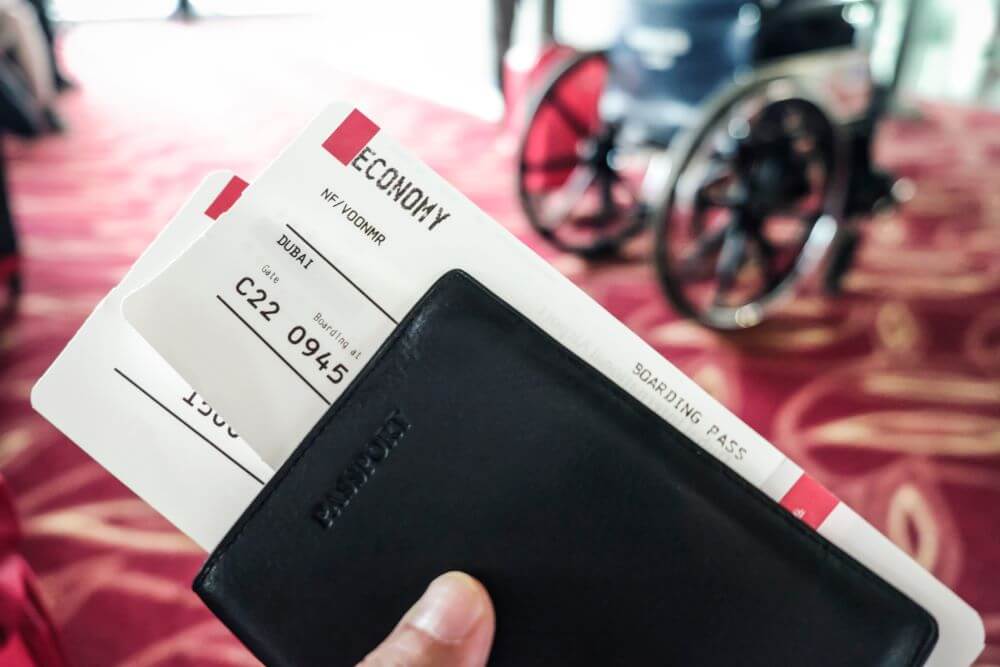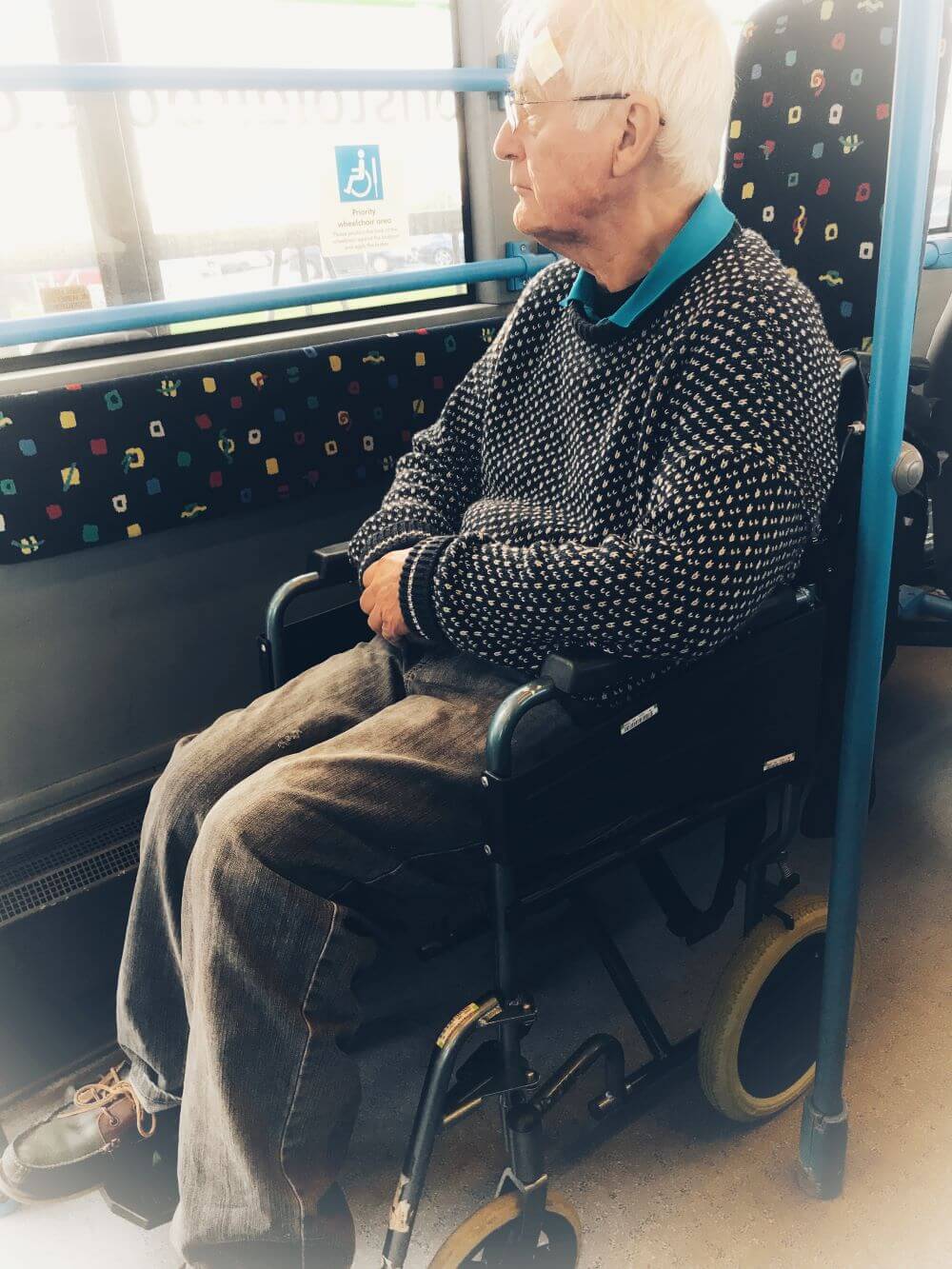Traveling with a loved one who has dementia can be both challenging and rewarding. As we embark on this journey together, let’s explore the nuances of dementia travel and discover practical ways to make it smoother for everyone involved.

Dementia Statistics: Understanding the Landscape
Before delving into the intricacies of traveling with someone with dementia, let’s take a moment to understand the broader context. Currently, more than 55 million people worldwide live with dementia, and every year, almost 10 million new cases emerge.
Among them, 70% live in the community, and surprisingly, 25% still live alone. Dementia can stem from various diseases and injuries affecting the brain, but Alzheimer’s disease is the most common form, contributing to 60–70% of cases.
The life expectancy for someone with dementia can range from 3 to 20 years. This means there are many people with early dementia who are still living a reasonably normal life which includes traveling.
Now, armed with a deeper understanding, let’s explore the practical aspects of dementia travel.

Preparing for the Journey
Medical Check-Up and Consultation
Begin your travel preparations with a thorough medical check-up and consultation with the healthcare provider. Ensure medications are up-to-date, and ask about potential challenges that may arise during the journey.
Gather Necessary Documents
Gather all necessary documents and identification. Having these in order can be a lifesaver during travel, helping you navigate smoothly through various checkpoints.
Create a Thoughtful Itinerary
Craft a travel itinerary that considers your loved one’s routine. Maintaining familiarity can provide comfort and stability, reducing stress for both the traveler and the caregiver.
Packing Essentials
Medications and Comfort Items
Pack all necessary medications and medical supplies. Additionally, bring familiar items that hold sentimental value or provide comfort. These can be a source of reassurance during unfamiliar moments.
Emergency Preparedness
Include emergency contact information in your packing list. In case of unexpected situations, having this information readily available can make a significant difference.
Consider Modes of Transportation
Choosing the right mode of transportation is a crucial decision that significantly impacts the overall travel experience for both the person with dementia and the caregiver. Here, we’ll explore the unique challenges and accommodations associated with air travel, road trips, and alternative transportation options.

Air Travel
Challenges:
- Security Checks: Airport security procedures can be overwhelming, with long queues, loud noises, and unfamiliar surroundings.
- Confined Spaces: The tight spaces within the aircraft can be disorienting for someone with dementia, especially during extended flights.
- Schedule Rigidity: Strict flight schedules may not align with the person’s routine, leading to potential stress.
Accommodations:
- Priority Boarding: Many airlines offer priority boarding, allowing extra time and space for a calmer boarding process.
- Direct Flights: Opt for direct flights to minimize the number of transitions and reduce overall travel time.
- Inform the Airline: Inform the airline in advance of the passenger’s condition to receive additional support.

Road Trips
Challenges:
- Monotony: Long hours on the road can lead to restlessness and boredom, impacting the person’s mood and comfort.
- Restroom Accessibility: Frequent restroom breaks may be necessary, and planning for accessible facilities is essential.
- Motion Sensitivity: Some individuals with dementia may experience motion sickness, making road travel challenging.
Accommodations:
- Frequent Stops: Plan regular breaks to allow the person to stretch, use the restroom, and enjoy a change of scenery.
- Comfort Items: Bring familiar items from home to create a sense of comfort within the vehicle.
- Entertainment: Prepare engaging activities or bring along music that the person enjoys to make the journey more pleasant.

Alternative Transportation
Challenges:
- Unfamiliarity: Using alternative transportation modes like trains or buses may introduce unfamiliar environments and routines.
- Crowded Spaces: Public transportation can be crowded, leading to potential confusion and discomfort.
- Schedule Dependence: Adhering to fixed schedules may pose challenges if they don’t align with the person’s routine.
Accommodations:
- Off-Peak Travel: Consider traveling during off-peak hours to minimize crowds and create a more relaxed atmosphere.
- Reserved Seating: When possible, reserve specific seats to ensure a more comfortable and controlled environment.
- Travel Companions: Having a familiar companion can provide emotional support and assistance during the journey.

Final Tips for Choosing Transportation
- Know Your Loved One’s Preferences: Consider the person’s history and preferences when selecting a mode of transportation. Familiarity can provide comfort.
- Consult with Healthcare Professionals: Before deciding on a mode of transportation, consult with healthcare professionals to ensure it aligns with the person’s physical and mental well-being.
- Plan Adequate Rest Time: Incorporating sufficient rest time into the itinerary is crucial regardless of the chosen mode. This allows the person to recharge and reduces the likelihood of fatigue and disorientation.
By carefully considering these factors and tailoring your choice of transportation to the individual’s needs, you can significantly enhance the travel experience for someone with dementia. Remember, the goal is to create a journey that prioritizes comfort, minimizes stress, and allows for meaningful moments along the way.

Dementia-Friendly Accommodations
Selecting the right accommodations is crucial for a positive travel experience when dealing with dementia. Here are key considerations to keep in mind:
Quiet and Familiar Environment:
Choose accommodations in quieter areas, away from busy streets or loud common areas.
Familiar surroundings can provide comfort, so opt for hotels with simple and recognizable decor.
Safety Features:
Prioritize accommodations with safety features such as handrails in bathrooms and non-slip flooring to prevent accidents.
Check if the room has proper lighting, especially during nighttime, to reduce the risk of falls.
Easy Navigation:
Opt for rooms that are easily accessible, minimizing the need for navigating through complex corridors.
Ground floor rooms or those near elevators can be more convenient.
Specialized Training for Staff:
Inquire if the hotel staff has received dementia awareness training.
Trained staff can offer better support and understanding during your stay.
Flexible Meal Options:
Choose accommodations that offer flexible meal options, accommodating dietary preferences and providing familiar foods.
Having a kitchenette can be beneficial for preparing familiar snacks or meals.
Quiet Hours and Routines:
Inquire about the establishment’s policies regarding quiet hours to ensure a peaceful environment during crucial rest times.
Establishing a routine can be helpful, so ask if the hotel can provide consistent mealtime and housekeeping schedules.
Communicating with Hotels or Hosts
Inform in Advance:
Reach out to the hotel or host well in advance of your stay.
Clearly communicate your loved one’s condition, highlighting any specific needs or preferences.
Request Special Accommodations:
Don’t hesitate to request special accommodations, such as a room closer to the main entrance or additional safety measures.
Specify any requirements for bedding or seating arrangements.
Discuss Check-In Procedures:
Inquire about a seamless and quiet check-in process to avoid unnecessary stress.
Consider requesting an expedited check-in to minimize waiting times.
Share Emergency Information:
Provide the hotel with emergency contact information and a brief overview of how they can assist in case of any issues.
Ensure they are aware of any medical conditions or allergies.
Emphasize Patience and Understanding:
Remind the staff to approach interactions with patience and understanding.
Encourage them to communicate calmly and clearly with your loved one.
Request a Quiet Room:
Specifically request a room in a quieter section of the hotel to create a more peaceful atmosphere.
Confirm that the room is away from noisy areas like elevators or vending machines.
By being proactive in selecting dementia-friendly accommodations and effectively communicating your loved one’s needs with hotels or hosts, you can significantly enhance the overall travel experience. Remember, the goal is to create a supportive environment that allows for comfort and relaxation throughout the stay.
Challenges in Different Stages

Early Stage Challenges
In the early stages of dementia, individuals may still possess a degree of independence, but subtle signs of cognitive decline can become apparent. Traveling during this stage may present unique challenges:
Occasional Memory Lapses:
Individuals in the early stages may experience occasional memory lapses, leading to challenges in remembering travel details and plans.
Mild Confusion:
Mild confusion may arise, especially in unfamiliar environments such as airports or new cities.
Strategies to Support:
Create a Travel Checklist:
Develop a simple checklist outlining essential travel details like tickets, identification, and medications.
Referencing a checklist provides a visual aid that can aid memory and reduce stress.
Routine Maintenance:
Maintain a consistent daily routine during travel to provide familiarity.
Stick to regular meal times and ensure the person is well-rested.
Middle Stage Challenges
As cognitive decline progresses into the middle stages of dementia, challenges become more pronounced. Traveling during this phase requires increased flexibility and adaptability:
Increased Confusion:
Individuals may struggle with recognizing familiar faces and places, leading to heightened confusion.
Potential Mood Swings:
Mood swings and emotional fluctuations may become more apparent, impacting the overall travel experience.
Strategies to Manage:
Adjust Travel Plans:
Opt for shorter travel durations and less complex itineraries.
Choose familiar destinations that evoke positive memories.
Provide Clear Communication:
Communicate plans clearly and avoid overwhelming the individual with excessive details.
Use visual aids and simple language to convey information.
Bring Comfort Items:
Pack familiar items that offer comfort and security, such as a favorite blanket or photo album.
Late Stage Challenges
In the late stages of dementia, significant cognitive impairment poses substantial challenges, necessitating a tailored and compassionate approach to travel:
Cognitive Impairment:
Memory loss becomes profound, making it challenging for the individual to recognize even close family members.
Behavioral Issues:
Behavioral issues, such as agitation or aggression, may arise, adding complexity to the travel dynamics.
Strategies for Special Consideration:
Familiar Objects:
Bring cherished and familiar objects that provide a sense of comfort and security.
These items act as anchors in an otherwise unfamiliar environment.
Calm Environment:
Prioritize accommodations in quiet and peaceful settings to minimize stimuli.
Create a calm and soothing environment to reduce anxiety.
Personalized Care:
Tailor travel plans to the individual’s needs, allowing for ample time for rest and relaxation.
Consider enlisting additional assistance, ensuring a higher level of support.

General Tips Across Stages
Continuous Monitoring:
Regularly monitor the person’s well-being and adjust plans accordingly.
Be attentive to signs of discomfort or distress.
Adaptability:
Embrace flexibility in travel plans, accommodating the individual’s changing needs.
Have contingency plans for unexpected challenges.
Seek Support:
If traveling alone, consider having a travel companion for additional support.
Communicate with healthcare professionals for guidance and recommendations.
Navigating the challenges of dementia during travel requires a thoughtful and person-centered approach. By understanding the unique demands of each stage and implementing tailored strategies, caregivers can ensure a more comfortable and enjoyable journey for their loved ones.

Returning Home
Ease Back into Routine
Upon returning home, ease back into the routine gradually. The transition can be challenging, and allowing time for adjustment is essential.
Reflect and Learn
Take a moment to reflect on the trip and learn from the experience. Consider what worked well and what could be improved for future travels.
Conclusion:
In conclusion, traveling with someone with dementia requires thoughtful planning, adaptability, and a deep understanding of your loved one’s needs. By incorporating these practical tips and insights into your travel preparations, you can create meaningful and memorable experiences for both of you.
Now, armed with the knowledge of dementia travel, embark on your journey with confidence, knowing that you’re equipped to make the road ahead smoother and more enjoyable.
💜 Safe travels!








